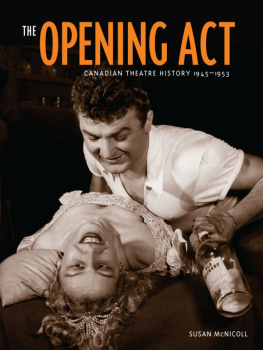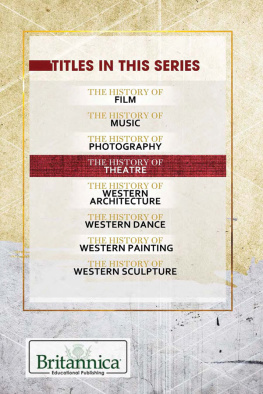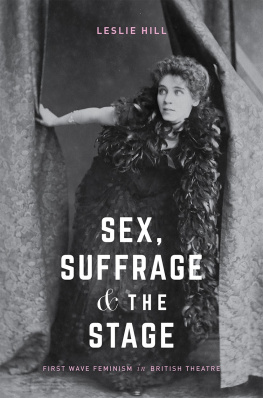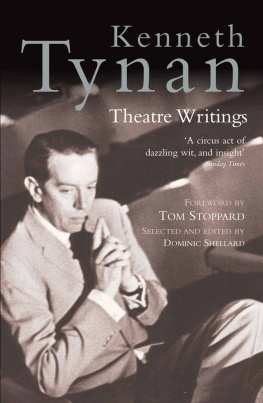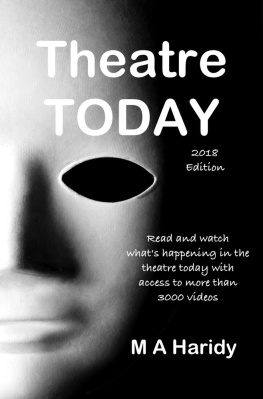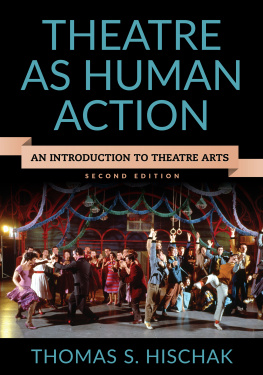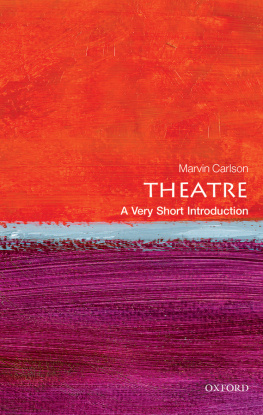There are many people to thank who helped bring this book to fruition. Firstly, there is John Drewery, Dorothy Davies and Rudy Horwood, who many years ago helped me secure the Canada Council grant that started this project. The Canada Council itself deserves a vote of thanks for believing in my vision of Canadian theatre in the post-WWII period. Thanks also go out to my mother, Anne Caza (I wish you were still here to see the book in print); to my father (I finally did it, and an important time in your life is recorded); to my publisher, Ronald Hatch, who has stayed the course; to the librarians at the old Vancouver Public Library; and those in the theatre division of the Toronto Public Library.
I am grateful to the following actors who shared their time and their stories with me, for without them, this book would never have been written. I am honoured to have met all of them: Thor Arngrim, Yvette BrindAmour, Vernon Chapman, Robert Christie, Dorothy Davies, Donald Davis, Ted Follows, David Gardner, Amelia Hall, Barbara Hamilton, Don Harron, Peggy Hassard, Arthur Hill, Eric House, William Hutt, Charmion King, Paul Kligman, Betty Leighton, David Major, Lois McLean, Peter Mews, Mavor Moore, Sam Payne, Toby Robins, Jean-Louis Roux, Lister Sinclair, Peter Sturgess, Murray Westgate, Herbert Whittaker, and two actors who gave me multiple interviews and great encouragementChristopher Plummer and Joy Coghill.
Finally, I want to thank all the cats in my life who have supported me, encouraged me, and who continued to believe in this project through the years even when my own faith stumbledyou know who you are.
conducted by the author.
SELECT BIBLIOGRAPHY
Anthony, Geraldine, ed. Stage Voices: Twelve Canadian Playwrights Talk About their Lives and Work. Toronto: Doubleday Canada, 1978.
Appleford, Robert, ed. Aboriginal Drama and Theatre. Toronto: Playwrights Canada Press, 2005.
Boss, Allan. Identifying Mavor Moore: A Historical and Literary Study. Toronto: Playwrights Canada Press, 2011.
Butler, Sydney, ed. Arts in our Lives. Vancouver: Brock House Writers, 2002.
Chapman, Vernon. Whos in the Goose Tonight: An Anecdotal History of Canadian Theatre. Toronto: ECW Press, 2001.
Cushman, Robert. Fifty Seasons at Stratford. Toronto: McClelland & Stewart, 2002.
Davies, Robertson. Happy Alchemy: On the Pleasures of Music and the Theatre. Toronto: McClelland & Stewart, 1997.
Edmonstone, Wayne E. Nathan Cohen: The Making of a Critic. Toronto: Lester and Orpen, 1977.
Garebian, Keith. William Hutt: A Theatre Portrait. Oakville: Mosaic Press, 1988.
Grace, Sherrill and Jerry Wasserman, eds. Theatre and AutoBiography: Writing and Performing Lives in Theory and Practice. Vancouver: Talonbooks, 2006.
Guthrie, Tyrone, Robertson Davies and Grant Macdonald. Renown at Stratford: A Record of the Shakespeare Festival in Canada. Toronto: Clarke, Irwin & Company, 1953.
Hall, Amelia Wells and Diane Mew, eds. Life Before Stratford: The Memoirs of Amelia Hall. Toronto: Dundurn Press, 1989.
Hamelin, Jean. The Theatre in French Canada (19361966). Quebec: Dept. of Cultural Affairs, 1986.
Harron, Martha. Don Harron: A Parent Contradiction. Don Mills: Collins Publishers, 1988.
Kennedy, Brian. The Baron Bold and the Beauteous Maid: A Compact History of Canadian Theatre. Toronto: Playwrights Canada Press, 2004.
Lydiatt Shaw, Grace. Stratford under Cover: Memories on Tape. Toronto: NC Press, 1977.
Moore, Mavor. Reinventing Myself: Memoirs. Toronto: Stoddart Publishing Co., 1994.
Nardocchio, Elaine F. Theatre and Politics in Modern Quebec. Edmonton: University of Alberta Press, 1986.
Plummer, Christopher. In Spite of Myself: A Memoir. New York. Toronto: Alfred A. Knopf, 2008.
Ratsoy, Ginny, ed. Theatre in British Columbia. Toronto: Playwrights Canada Press, 2006.
Sperdakos, Paula. Dora Mavor Moore: Pioneer of the Canadian Theatre. Toronto: ECW Press, 1995.
Wagner, Anton, ed. Establishing Our Bounderies: English-Canadian Theatre Criticism. Toronto: University of Toronto Press, 1999.
Wallace, Robert and Cynthia Zimmerman. The Work: Conversations with English-Canadian Playwrights. Toronto: Coach House Press, 1982.
Wasserman, Jerry. Spectacle of Empire: Marc Lescarbots Theatre of Neptune in New France. Vancouver: Talonbooks, 2006.
Whittaker, Herbert. Setting the Stage. Montreal & Kingston: McGill-Queens University Press, 1999.
. Whittakers Theatricals. Toronto: Simon & Pierre, 1993.
Yeo, Leslie. A Thousand and One First Nights. Oakville: Mosaic Press, 1998.
CHAPTER ONE
THE BEGINNINGS OF CANADIAN
THEATRES RENAISSANCE
[Canadians] have never been without theatre
and its my contention that the theatre is a natural
expression of society.... Wherever you set people
down, some theatrical expression will emerge.
HERBERT WHITTAKER
Just as homegrown professional theatre in Canada did not spring fully formed from the Stratford Festival, the early post-war flurry of professional theatre activity was not the first seen in Canada. Most of the earlier theatre in the nineteenth and early twentieth centuries, however, was amateur and sporadic. That, in turn, was preceded by decades of amateur theatre brought from Europe, thought at first to have begun with a production of Le Thtre de Neptune en la Nouvelle-France on November 14, 1606, in Port Royal (once the capital of Acadia and now a small community in the western part of Nova Scotia). It has been recently discovered, however, that there was an even earlier European theatrical event, in 1583, when explorer Sir Humphrey Gilbert had a small group of entertainers on his ship perform during anchorage in St. Johns, Newfoundland.
Of course, for hundreds of years prior to the arrival of the European amateur theatres, there had been what is sometimes referred to as paratheatre among North Americas indigenous peoples. These were performances, often spiritual, involving rituals and dancing enacted in elaborate costumes and frequently using sophisticated stage effects.
For traditional European-style theatre, one can look to the mid-eighteenth century, which saw a good deal of garrison theatre, a term used to describe the theatrical activities of the British and French army and navy personnel stationed in the territory that would become Canada. While residents of the early colonies were not involved in these productions, they were beneficiaries of the theatres built by soldiers for their own performances. For example, in Halifax the soldiers built the New Grand Theatre, which opened in 1789 with a production of Shakespeares Merchant of Venice.
The first professional theatre group to play in Canada was The American Company of Comedians in Halifax, Nova Scotia in 1768. By the 1780s, amateur theatres had begun to spring up in Newfoundland, followed quickly by companies in other colonies. These performances usually took place in town halls or taverns, typically with all-male casts. Often the biggest obstacle theatres faced at the time came from the church, both Protestant and Catholic, which still often compared theatres to brothels.
By the mid-nineteenth century, most Canadian towns had a stage, but few had real theatre buildings. The stage usually consisted of a raised platform at the end of a long room in the town hall. Some cities, however, had buildings resembling real theatres and they began bringing in professional companies, the majority from Britain. Canadian-born actor Graves Simcoe Lee was a member of one such company, and he wrote what is said to be the first play by a Canadian seen on a Toronto stage.

